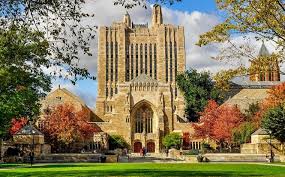Nestled amidst the historic charm of New Haven, Connecticut, Yale University stands as a testament to the enduring power of tradition and intellectual pursuit. Founded in 1701, Yale is one of the nation’s oldest and most prestigious universities, boasting a rich history steeped in academic excellence and groundbreaking contributions to various fields. This article delves into the core values that define Yale, exploring its commitment to a well-rounded education, its vibrant research environment, and its dedication to fostering global engagement and social impact.
From Puritan Roots to Global Prominence
Yale’s story begins with a vision rooted in religious education. Ten Puritan ministers established the Collegiate School, which would later become Yale College, with the aim of educating future ministers and leaders for the colony of Connecticut. This emphasis on rigorous scholarship and civic engagement continues to be a cornerstone of the Yale experience.
Over the centuries, Yale has evolved beyond its religious origins to become a global leader in higher education. The university established its renowned Graduate School in 1847, followed by the Yale School of Law and Yale School of Medicine in the mid-19th century. Today, Yale boasts fourteen schools and institutes, offering a comprehensive range of undergraduate and graduate programs across diverse disciplines, from the humanities and social sciences to law, medicine, and business.
Yale’s commitment to academic excellence is undeniable. Its faculty ranks include renowned scholars, Nobel laureates, and leading figures in their respective fields. These accomplished individuals not only impart knowledge but also inspire and guide the next generation of scholars and leaders. Students have the privilege of learning from the very minds shaping the discourse and pushing the boundaries of their disciplines.
Cultivating Well-Rounded Minds
Yale’s unique educational philosophy emphasizes a well-rounded education, fostering intellectual curiosity and critical thinking skills alongside professional development. The undergraduate curriculum at Yale College encourages students to explore diverse disciplines beyond their chosen major, fostering a breadth of knowledge and a deeper understanding of the world.
This commitment to a liberal arts education ensures that Yale graduates are not only highly specialized in their fields but also possess the critical thinking skills, communication abilities, and cultural awareness necessary to thrive in a complex world. Furthermore, Yale’s residential college system fosters a strong sense of community, where students live, learn, and socialize together, creating a rich learning environment that extends beyond the classroom.
A Crucible of Groundbreaking Research
Yale is not simply a haven for undergraduate education; it is also a powerhouse of research. Across its various schools and institutes, researchers tackle some of humanity’s most pressing challenges. From pioneering advancements in medicine and neuroscience to groundbreaking discoveries in the social sciences and humanities, Yale researchers are constantly pushing the boundaries of knowledge and developing solutions to real-world problems.
The Yale School of Medicine, consistently ranked among the nation’s best, is a hub of medical breakthroughs. Yale researchers have made significant contributions to fields like cancer research, immunology, and genetics, leading to the development of life-saving treatments and advancements in healthcare. Additionally, the Yale School of Law fosters a vibrant research environment, where scholars tackle complex legal issues with global implications.
Yale’s research endeavors are not confined to its New Haven campus. The university actively fosters collaboration with international partners, tackling global challenges like climate change, poverty, and infectious diseases. This commitment to global engagement ensures that Yale’s research has a significant impact on the world stage.
Fostering Global Leaders and Social Impact
Yale recognizes that its responsibility extends beyond academics and research. The university cultivates a strong commitment to global citizenship and social impact. Undergraduate programs like the Brady-Johnson Program in Grand Strategy and the Jackson Institute for Global Affairs prepare students for leadership roles in solving global challenges.
Additionally, Yale encourages student participation in service-learning opportunities through initiatives like the Yale Public Interest Network. These programs allow students to utilize their academic skills to address social issues in New Haven and beyond, fostering a sense of civic responsibility and a dedication to making a positive impact on the world.
Yale’s alumni network embodies this dedication to social impact. From renowned policymakers and CEOs to activists and humanitarians, Yale graduates have gone on to become leaders in their respective fields, tackling complex challenges and shaping a better future. Their work serves as a testament to the university’s commitment to fostering well-rounded global citizens.
A Tapestry of Diversity and Inclusion
Yale recognizes that diversity of thought and experience enriches the academic environment. The university actively promotes inclusivity, attracting talented students from across the globe and from various backgrounds. This commitment to diversity ensures that Yale fosters a vibrant intellectual community where students can learn from and challenge each other, leading to a more comprehensive understanding of the world.
Yale also encourages a culture of open discourse and respectful debate. The university’s commitment to free speech allows for the exploration of diverse perspectives, fostering intellectual growth and critical thinking. This environment allows students to
